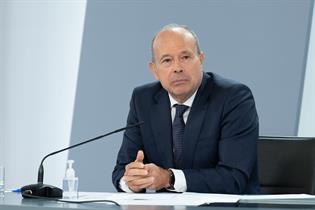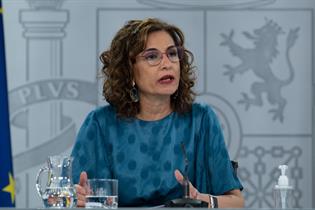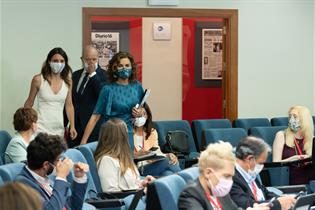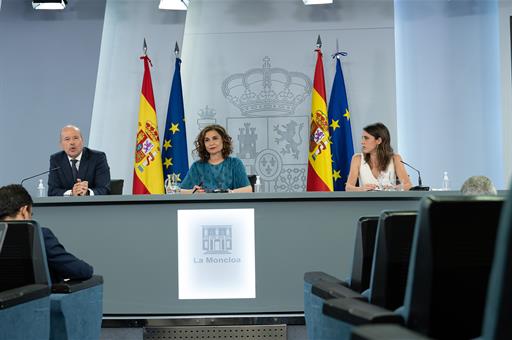Council of Ministers
The Government of Spain presents the law for the full and effective equality of transgender people and for the guarantee of LGBTI rights
Council of Ministers - 2021.6.29
Moncloa Palace, Madrid
The Council of Ministers has presented the draft bill on Full and Effective Equality for transgender people and for the guarantee of LGBTI rights, prepared by the Ministries for Equality and Justice and coordinated by the First Vice-President of the Government.
The Minister for the Treasury and Government Spokesperson, María Jesús Montero, stressed that with this law the Government aims to overcome the invisibility, stigmatisation and lack of recognition of the rights of lesbian, gay, bisexual, transsexual and intersex (LGBTI) people and to place Spain at the forefront of Europe in defending their rights.
The head of Equality, Irene Montero, pointed out that today is a historic day in the legislative advance of the rights of LGBTI people after the approval of equal marriage 15 years ago. She also stressed that the future law is a sign of the work, dialogue and strength of the coalition Government, which is an ally of the collective, and of a feminist way of doing politics.
Irene Montero has told trans and LGBTI people that "they are not alone" and that they have a Government that is an ally to convert all the rights that may be violated into public policies. "This Government works for people's happiness and to make their lives worth living".
The minister argued that the merit of the law does not lie solely with the Government, but with the groups and organisations that have been fighting for their rights for decades: "The protagonists of the push for this law are LGBTI people, particularly trans people, but also women, the feminists of this country".
"This is a feminist law that understands that either we all get there, or we are all capable of getting off sticky ground, or we are all capable of eliminating all the discrimination to which we are subjected, or none of us will get there", added Irene Montero.
Rights and obligations contained in the future law
 Foto: Pool Moncloa/Borja Puig de la BellacasaThe Minister for Justice, Juan Carlos Campo, has indicated that the objectives of the future law are to guarantee and promote the right to real and effective equality of LGBTI people; to prevent and eliminate all types of discrimination that affect the social perception of the collective and their families; and to establish the registry rectification of the sex and name of individuals.
Foto: Pool Moncloa/Borja Puig de la BellacasaThe Minister for Justice, Juan Carlos Campo, has indicated that the objectives of the future law are to guarantee and promote the right to real and effective equality of LGBTI people; to prevent and eliminate all types of discrimination that affect the social perception of the collective and their families; and to establish the registry rectification of the sex and name of individuals.
Campo pointed out that the law includes provisions to guarantee equal treatment and non-discrimination with measures in areas of administration, employment, health, education, culture, leisure, sport, family, children and young people, initiatives in the areas of advertising, the media and the internet, and measures in the field of external action and international protection.
In this regard, Irene Montero stressed that the future law recognises the right to self-determination of gender identity. Transgender people are no longer legally considered ill and can be recognised by the authorities without any psychiatric report being required.
The text incorporates positive action measures to tackle the discrimination most frequently suffered by LGBTI people in all areas. Among them, the minister highlighted that lesbian, bisexual and single women will once again have access to assisted reproduction techniques, as well as transgender people with gestational capacity.
The draft bill amends the Civil Code so that lesbian or bisexual women are both recognised as mothers of their children even if they are not married. In addition, conversion therapies aimed at changing a person's sexual orientation, sexual identity or gender expression are prohibited.
It also establishes a system of infringements and sanctions to address the discrimination faced by this group in various areas, such as access to housing, health and relations with the administration.
Registration and sex reassignment procedure
 Foto: Pool Moncloa/Borja Puig de la BellacasaThe Minister for Justice explained that the text contemplates the change of legal sex from the age of 12, in different age brackets and according to the maturity and stability of the applicant.
Foto: Pool Moncloa/Borja Puig de la BellacasaThe Minister for Justice explained that the text contemplates the change of legal sex from the age of 12, in different age brackets and according to the maturity and stability of the applicant.
The procedure to change sex in the registry of minors between 12 and 14 years of age will be by means of a voluntary jurisdiction file, that is, a judicial resolution will determine it. Persons between 14 and 16 years of age will have to go to the Civil Registry, accompanied by their parents or an "advocate", where they will fill in a form and receive information about the legal consequences of the change. Applicants between the ages of 16 and 18 will be able to change their sex independently at the Civil Registry.
Within a maximum period of three months, applicant shall appear again to ratify their application and the person in charge of the register shall issue a decision within a maximum period of one month following this second appearance.
The minister pointed out that the law foresees the possibility of a sex change reversal process, for which the minor will have to wait six months.
Spain, at the forefront of Europe
The Minister for Equality said that Spain is at the forefront in Europe in terms of recognising the rights of LGBTI and trans people, in line with the leadership that the President of the Government, Pedro Sánchez, is exercising with regard to rights and freedoms and human rights as the basis for coexistence in Europe, in a context in which LGBTI-phobic aggressions are on the rise.
In the same vein, the Minister for Justice stated that the text follows the tradition of the leading countries in this area, such as Belgium, Norway and Malta.
Grants and scholarships for the next academic year
The Government has agreed the new income and family wealth thresholds for accessing study grants and scholarships for the next academic year 2021-2022, as well as their amount.
María Jesús Montero has stated that the provision has been gradually increasing since 2018 and is now 40% higher. Specifically, it exceeds two billion euros, "a record figure that demonstrates our commitment to study and talent and, above all, to ensuring that there is no discrimination between people on the basis of income".
Montero stressed that the number of beneficiary students will increase by 24.5% and, with the new thresholds, many students who previously did not meet the requirements will be able to access a grant or aid. The amounts for regular recipients are also increased, e.g. the grant for students in basic vocational training will be 350 euros instead of 300 euros.
With regard to university studies, an average mark of 5 will be sufficient to qualify for a scholarship for the qualifying Masters' degree instead of the 6.5 that was required until now, "which was particularly detrimental to people on lower incomes who often combine their studies with part-time or full-time work".
Other new features include students with severe communication and language disorders as beneficiaries and the simplification of the requirements for students who are victims of gender violence, who will no longer have to prove to the education authority that they are underachieving as a result.
1.32 billion in aid for self-consumption and renewable energy storage
 Foto: Pool Moncloa/Borja Puig de la BellacasaThe Council of Ministers has approved the direct granting of aid to encourage self-consumption and storage of renewable energy within the framework of the Recovery, Transformation and Resilience Plan. This aid will allow for the renovation of air-conditioning and hot water systems and the installation of batteries, for example.
Foto: Pool Moncloa/Borja Puig de la BellacasaThe Council of Ministers has approved the direct granting of aid to encourage self-consumption and storage of renewable energy within the framework of the Recovery, Transformation and Resilience Plan. This aid will allow for the renovation of air-conditioning and hot water systems and the installation of batteries, for example.
The regional governments and cities will receive up to 1.32 billion euros until 2023. The initial allocation is 660 million euros, which can be doubled as the budget is implemented. The funds will be divided between three programmes targeted at specific economic sectors - services, industry and agriculture - and three programmes specifically designed for households.
María Jesús Montero explained that the amount of the aid will depend on the size of the companies and facilities, while a fixed percentage will be given to households. In municipalities with fewer than 5,000 inhabitants, the subsidy will be 10% higher as part of the demographic challenge policies.
More than 25,000 direct and indirect jobs are expected to be generated and nearly 2,000 MW of renewable energy will be installed, including the air-conditioning of more than 40,000 homes. It will also avoid the emission of one million tonnes of CO2 into the atmosphere each year, thus contributing to the climate neutrality target set for 2050 at the latest.
159 million euros for social care in municipalities and regional governments
The Executive has authorised the distribution of 159 million euros for the development of three programmes to protect families and deal with child poverty in municipalities and regional governments.
98 million euros are allocated to the Social Services agreed basic benefits Plan that, with the participation of the State and the Regional Governments, is managed by the local councils, making it the "fundamental step in reaching people who need social care", said Montero, who emphasised that this year's amount is the highest since this programme was launched in 1988.
The second programme, linked to the protection of families and children, will have 45 million euros available, which will be distributed among the regional governments and cities to carry out social intervention projects and grant benefits.
The remaining 15 million euros will cover the VECA Programme to Guarantee Children's Rights to Food, Leisure and Culture during School Holidays.
Report on COVID-19
 Foto: Pool Moncloa/Borja Puig de la BellacasaThe Council of Ministers has analysed the development of the vaccination campaign, for which 6.6 million new doses will be received this week. So far, 17 million people, 35% of the population, have already been fully vaccinated and almost 25 million have received their first dose: "We are achieving the highest vaccination rate in the European Union as a whole," stressed Montero, who nevertheless reiterated a message of caution for this final stretch before reaching the herd immunity target at the end of August.
Foto: Pool Moncloa/Borja Puig de la BellacasaThe Council of Ministers has analysed the development of the vaccination campaign, for which 6.6 million new doses will be received this week. So far, 17 million people, 35% of the population, have already been fully vaccinated and almost 25 million have received their first dose: "We are achieving the highest vaccination rate in the European Union as a whole," stressed Montero, who nevertheless reiterated a message of caution for this final stretch before reaching the herd immunity target at the end of August.
With regard to the pressure on hospitals, the spokeswoman assured that it remains at a good level and that the latest accumulated incidence figures are mainly associated with the infection of young people who have not yet been vaccinated. From now on, the data to be published will be segmented by age so that "the disparity between the incidence in older people who are already vaccinated and young people who are still awaiting vaccination" can be checked.
Also in relation to the digital certificate, 2.7 million certificates have already been issued, which means that many people "are expressing their willingness to travel in the coming weeks".
Transposition of EU directive
The Council of Ministers has approved the transposition of the European directive on the proportionality test to be applied before approving new regulated professions or when revising existing regulations into Spanish law.
Montero pointed out that the aim is to guarantee the mobility of professionals within the framework of the European Union and to promote competitiveness and greater market openness, while at the same time increasing transparency and the level of consumer protection.
Transfer of competences to the Basque Country
The Government has formalised the transfer of competences to the Basque Country, which had been agreed on 10 May in the Joint Commission on Transfers.
From 1 October, this region will manage the prisons located in its territory, taking on the roles of management, oversight, organisation, economic and administrative management and inspection, the ownership of the real estate affected and the 684 associated jobs. Montero reiterated that prison legislation and regulations will remain a state competence - common to all of Spain.
The other competencies transferred relate to road transport, the granting of international identification codes for serial publications of companies or entities in the Basque territory and the ownership of a building in the port of Ondarroa.
Action of unconstitutionality against a provision on the staff of the Parliament of La Rioja
The Council of Ministers has agreed to bring an action of unconstitutionality against the second transitional provision of the Staff Regulations of the Parliament of La Rioja.
María Jesús Montero explained that this challenge comes because the Statute, exceeding its competencies, has created a labour category under the name of permanent public employee "which is not regulated and which would theoretically have the same rights and obligations as the category of career civil servant", as well as its own civil service structure which violates the principles of equality, merit and capacity.
Non official translation





